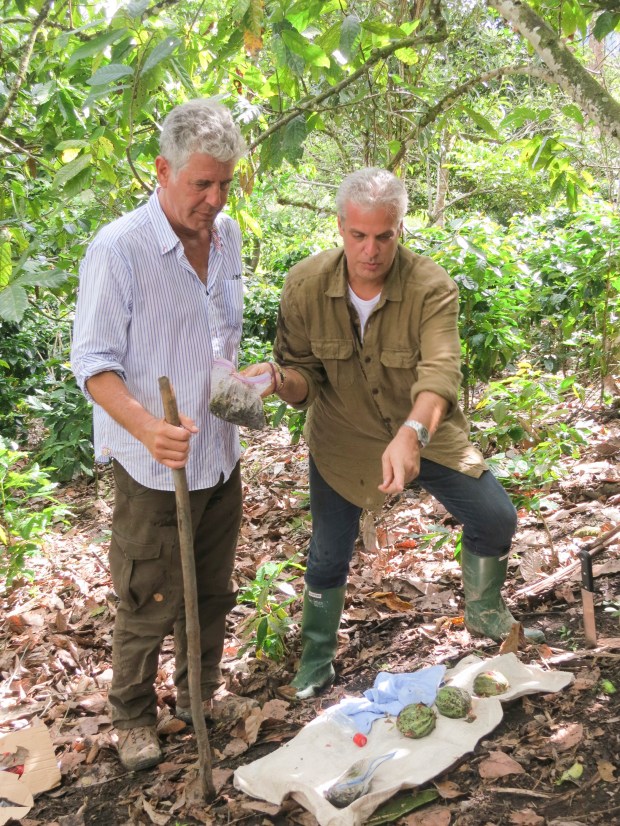Synopsis: Bourdain travels to Peru with friend and chef Eric Ripert. The two have recently gotten into the chocolate business and they want to inspect the source: a remote mountain valley in the Andes. They are joined by chocolatier Chris Curtin as they set out to see all-white cacao beans, some of the rarest in the world. As they explore the country, Bourdain and Ripert try the local street meat, unsweetened hot chocolate, fresh ceviche, and an ant-based reduction sauce. Contemplating, meanwhile, his future as a chocolatier, Bourdain wants to know: Where does it come from? How is it made? Most important: WHO does it come from? And are they getting a good piece of the action? Or are the producers, as in so many cases, getting screwed over?
On Peruvian cuisine being the next big thing:
“There are so many products in Peru that are unfamiliar to people in the States. When you eat this food, it’s not like, Well, this is something like … It’s not “kind of like” anything. It’s really awesome.”
“There seems to be a lot of interest in the last decade in the Amazon because it’s an amazing spectrum of entirely new—to most of us—flavors and ingredients.”
Imagine you took a lot of acid and then you ate that whole bowl of ants.
“Whole different flavor spectrum, right? All new. It’s almost like you need a new section of your tongue. I like the food. I’ve enjoyed these cocktails, too.”
“Imagine you took a lot of acid and then you ate that whole bowl of ants, and then you go home and you experience violent diarrhea and you’re tripping. It’s like 4 in the morning and you turn around and look at the toilet and all these ant heads are floating around in there. It would be cool.”
At the Rafael Larco Herrera Archeological Museum:
“I don’t know whether you knew this, but I am an aficionado of early erotica of pre-Columbian and post-Columbian eras—you know, like pottery of people doing it.”
“Wow, gold necklaces. You see why the Spanish just freaked out when they came here and turned into maniacal greedheads.”

On getting stuck in traffic:
“When dealing with complex transportation issues, the best thing to do is pull up with a cold beer and let somebody else figure it out.”
Guests weigh in:
Coque Ossio (chef) [on Peruvian cuisine]: “It’s changing in a way. What you’re eating now is the traditional food.”
The best thing to do is pull up with a cold beer and let somebody else figure it out.
Eric Ripert [translating for Don Fortunato, a farmer]: “He says up to 20 years ago, 25 years ago, it was easier for him. He was planting soybeans and coffee. And he was making much more money. And then he didn’t plant soybeans any longer and then the coffee production went down, so, therefore, he had a financial struggle for a while. And now with the cacao tree that they are planting, he has no more stress and is fairly upbeat himself.”
Ripert [on seeking a shaman’s assistance]: I know you won’t believe it, but the energy has changed [after the shaman’s blessing]. I’m serious. I’m not joking—I’m not joking.
Bourdain: Listen—I’m not disbelieving. I have an open mind.
Bourdain [on all-white cacao beans, which some people thought were extinct]: What’s unusual about these pods? These beans?
Chris Curtin: They’re extremely high quality in flavor.
Bourdain: Though not around for a while?
Curtin: This was what almost all chocolate was made of over 120 years ago, and now it’s making a giant comeback.